高中英语北师大版(2019)必修第二册-Unit 5 Lesson 2-课件
- 格式:pptx
- 大小:565.09 KB
- 文档页数:13
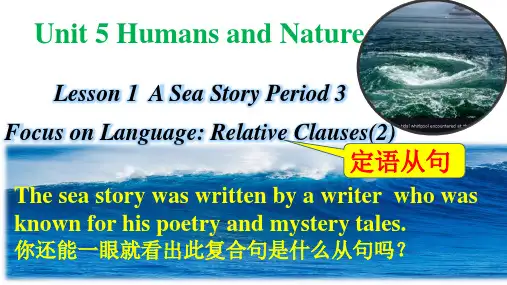
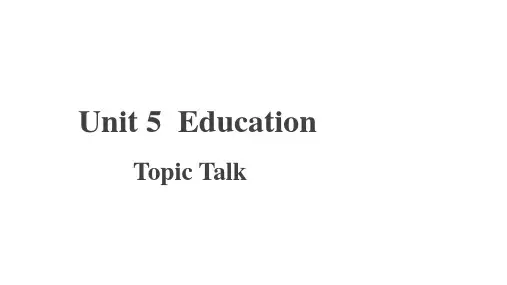
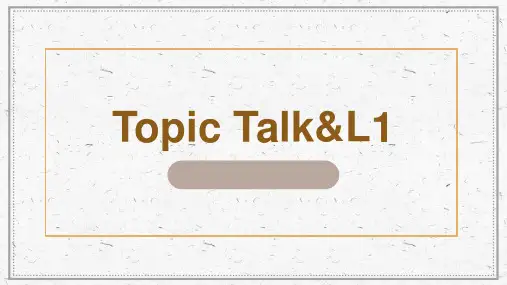
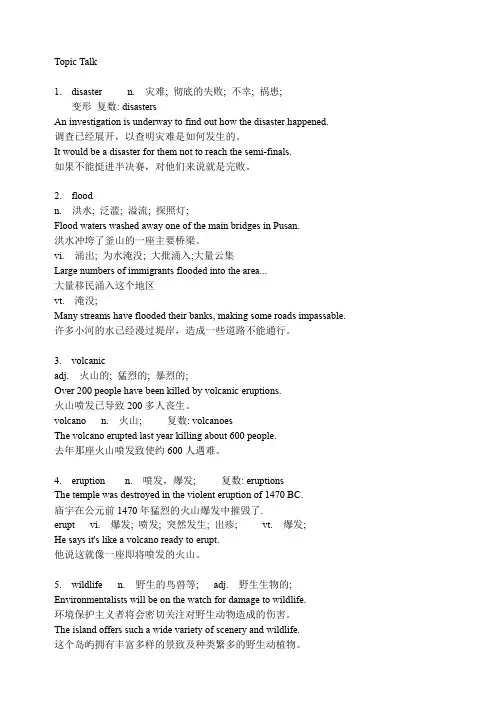
Topic Talk1.disaster n. 灾难; 彻底的失败; 不幸; 祸患;变形复数: disastersAn investigation is underway to find out how the disaster happened.调查已经展开,以查明灾难是如何发生的。
It would be a disaster for them not to reach the semi-finals.如果不能挺进半决赛,对他们来说就是完败。
2.floodn. 洪水; 泛滥; 溢流; 探照灯;Flood waters washed away one of the main bridges in Pusan.洪水冲垮了釜山的一座主要桥梁。
vi. 涌出; 为水淹没; 大批涌入;大量云集Large numbers of immigrants flooded into the area...大量移民涌入这个地区vt. 淹没;Many streams have flooded their banks, making some roads impassable. 许多小河的水已经漫过堤岸,造成一些道路不能通行。
3.volcanicadj. 火山的; 猛烈的; 暴烈的;Over 200 people have been killed by volcanic eruptions.火山喷发已导致200多人丧生。
volcano n. 火山; 复数: volcanoesThe volcano erupted last year killing about 600 people.去年那座火山喷发致使约600人遇难。
4.eruption n. 喷发,爆发; 复数: eruptionsThe temple was destroyed in the violent eruption of 1470 BC.庙宇在公元前1470年猛烈的火山爆发中摧毁了.erupt vi. 爆发; 喷发; 突然发生; 出疹; vt. 爆发;He says it's like a volcano ready to erupt.他说这就像一座即将喷发的火山。
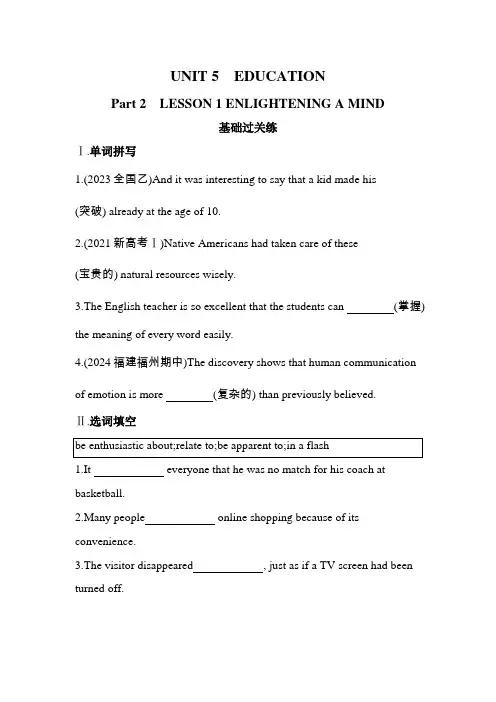
UNIT 5EDUCATIONPart 2LESSON 1 ENLIGHTENING A MIND基础过关练Ⅰ.单词拼写1.(2023全国乙)And it was interesting to say that a kid made his(突破) already at the age of 10.2.(2021新高考Ⅰ)Native Americans had taken care of these(宝贵的) natural resources wisely.3.The English teacher is so excellent that the students can (掌握) the meaning of every word easily.4.(2024福建福州期中)The discovery shows that human communication of emotion is more (复杂的) than previously believed.Ⅱ.选词填空1.It everyone that he was no match for his coach at basketball.2.Many people online shopping because of its convenience.3.The visitor disappeared, just as if a TV screen had been turned off.4.I found a very mixed group of individuals, some of whom I couldand some of whom I had very little in common with.Ⅲ.单句语法填空1.(gradual), we will grow up and see the importance of respecting others.2.He ran a hand up his face (gentle), exploring the wound with his fingers.3.They rode the elevator together at the end of an(unbearable) sticky day.4.She says that she enjoys the (excite) of telling stories to a crowd because she is an actress.5.Being the coach of the new team, I was excited because I knew we were going to win, but my disappointment we were defeated.6.Some think that a woman's body cells have a tendency (age) more slowly than a man's.7.My parents were anxious for me, because it was the first time that I (live) abroad.8.The other banks are going to be very eager (help), provided that he has a specific plan.9.Yuan Longping invented super hybrid rice, making it possible to increase rice harvests without (expand) the area of the field. Ⅳ.单元语法专练1.我不知道我的收音机出什么毛病了。
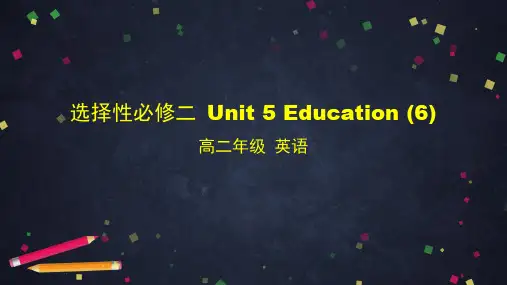
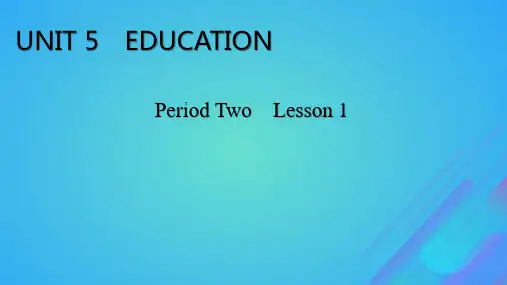
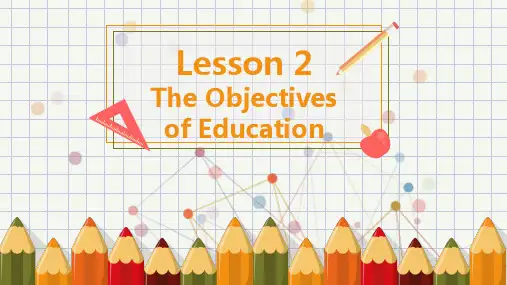
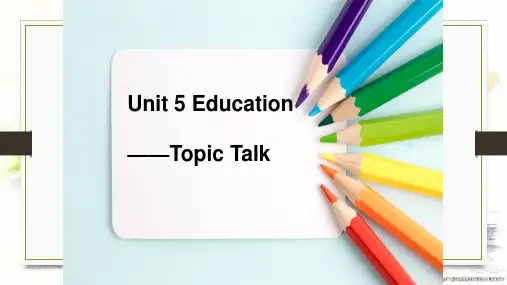
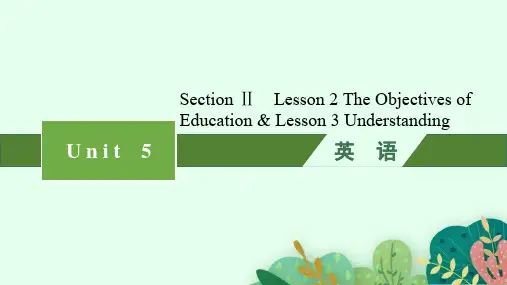
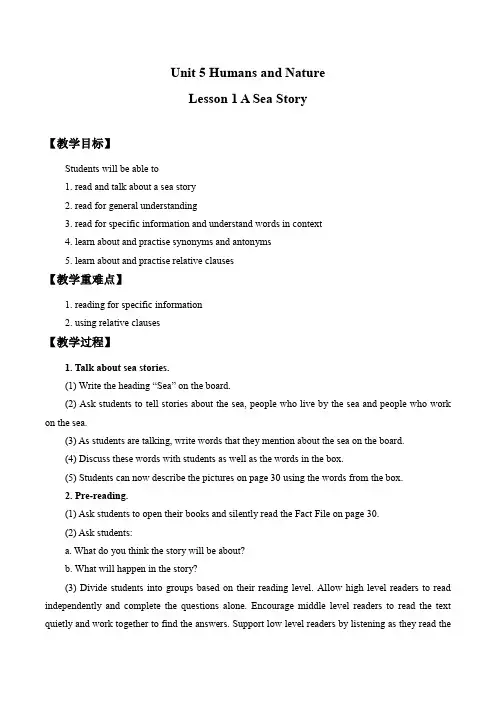
Unit 5 Humans and NatureLesson 1 A Sea Story【教学目标】Students will be able to1. read and talk about a sea story2. read for general understanding3. read for specific information and understand words in context4. learn about and practise synonyms and antonyms5. learn about and practise relative clauses【教学重难点】1. reading for specific information2. using relative clauses【教学过程】1. Talk about sea stories.(1) Write the heading “Sea” on the board.(2) Ask students to tell stories about the sea, people who live by the sea and people who work on the sea.(3) As students are talking, write words that they mention about the sea on the board.(4) Discuss these words with students as well as the words in the box.(5) Students can now describe the pictures on page 30 using the words from the box.2. Pre-reading.(1) Ask students to open their books and silently read the Fact File on page 30.(2) Ask students:a. What do you think the story will be about?b. What will happen in the story?(3) Divide students into groups based on their reading level. Allow high level readers to read independently and complete the questions alone. Encourage middle level readers to read the text quietly and work together to find the answers. Support low level readers by listening as they read thetext aloud and explaining unknown terms and tricky sentence structures.(4) Discuss the answers as a class.3. Read and discuss questions.(1) Tell students that they will be reading a sea story about a fisherman.(2) Allow students time to read the full article or call on volunteers to read the passage aloud.(3) Encourage students to try to use context to understand unknown terms.(4) If needed, instruct students to draw a ruler line under each paragraph. Then provide a general sentence for each paragraph that acts as a summary. This will help the students to sort out the new information.(5) In pairs, students answer the questions on page 30 in full sentences.4. Read again and complete.(1) Before students complete the exercise on page 31, preview the event chart they will be completing.(2) Then have students work alone to complete the sentences.(3) Encourage students to use their memory to answer questions and then use the text to check their answers. Ask students if this task has helped them understand the text better.(4) Support low level readers by providing a list of feelings for the storyteller that they can choose from.(5) If limited on time, students can highlight the necessary information in the text.5. Complete the illustration on page 32.Divide students into groups based on their understanding level. Allow high level students to complete the drawing telling the story. Encourage middle level students to read the text again quietly and work together to complete the drawing telling the story. Support low level students by listening as they read the text aloud and explain unknown terms. Then provide sentence frames for low level students to complete.6. Think and share.(1) Divide students into small groups to read the questions on page 32.(2) Students need to reread the text and answer the questions in full sentences.7. Pair Work: Find synonyms and antonyms.(1) Discuss with students that synonyms are words with similar meanings and antonyms are words with opposite meanings.(3) Instruct students to complete the exercise independently.(4) Check answers as a class.8. Complete the summary.(1) Have students read the sentence frames aloud.(2) Check that students understand the vocabulary and context.(3) Instruct students to complete the sentences using vocabulary based on the story.(4) Call on volunteers to read the completed sentences to check answers as a class.9. Pair Work: Understand relative clauses.(1) Explain to students that a relative clause a part of a sentence that has a verb in it and is joined to the rest of the sentence by “who”, “which”, “where”.(2) Instruct students to work in pairs to underline the words that introduce relative clauses and circle the words that the relative clauses refer to.(3) If needed, have students look at the Grammar Summary, Unit 1, relative clauses on page 92. Read through the rules and examples with the class and ensure that students understand relative clauses in the examples.10. Pair Work: Read, compare and choose.(1) Divide students into pairs.(2) Instruct students to read each sentence pair aloud and decide which sentence is better. Students need to support their answer.(3) Explain to students that using relative clauses helps to make the sentences logically clearer and concise. Relative clauses can also help to omit repeated words and expressions.11. Using relative clauses.Let each student have a turn to read the sentence frames and complete the sentences using relative clauses and personal answers.12. Pair Work: Express yourself.Instruct students to divide into pairs. Each student is to tell their partner a special and personal experience. Students must use relative clauses.。
Unit 5 Humans and Nature Topic Talk5.1 (P= Presenter S = Sarah Hughes)P: And you are now on Radio Richmond. We’ve got Sarah Hughes from West London Wildlife. Sarah, do you teach people about nature in this part of London?S: Yes, we’re lucky. Actually, 1.______________ (整个城市)is quite green. About66 percent of the city 2. ______________(被…所覆盖)water or green space.Amazing, isn’t it? And there are three million 3. ______________(私人花园). P:Three million? Wow!S: Yes. 4. ______________(这对野生动物很好). You can see different kinds of birds – there are over 350.And there are other interesting animals too, like deer. My favourite animals are deer. We’ve got them here in Richmond Park.P: Talking about nature, what about the Thames River?S: Well, there’s less water pollution now than fifty years ago. In fact, there are about120 different kinds of fish in the river.P:And climate change?S: I think our climate is 5. ______________(确实是在变化). And the 6.______________(温室效应)is 7. ______________(很明显). For example, the winters aren’t as cold these days and we don’t get snow very often.P: And other environmental problems?S: The biggest environmental problems are air pollution and noise pollution from cars and airplanes. Nearly forty days a year in London 8. ______________(遭受)dangerous levels of pollution. That’s very worrying.P: OK, thanks a lot, Sarah, for sharing with us.5.2 (B= Boy G=Girl)B: Wow. The lecture was so shocking. I didn’t know we 9. ______________(正如此严重地破坏着自然).G: 10. ______________(我也不知道). We tried to 11. ______________(利用自然)as much as we could, but we 12. ______________(做得太过分了). Nature got hurt, felt pain, and 13. ______________. (最终背弃了我们)B: Yes. Nature is our home. Humans, animals, plants and all other living things live in it. We should 14. ______________(爱护)our “home”.G: Just like 15. _________________(讲座的标题)– Living with Nature – we should protect nature.B:I agree. In the future, we should…Unit 5 Lesson 1 A Sea Story (Part 1)About three years ago, something terrible happened to me. That was the day when it took only six hours to 1. __________________ (击碎我的身体和灵魂). You think I am a very old man – but I am not. It took 2. __________________ (不到一天的时间) to change my hair from black to white.One day, my two brothers and I were coming back from the islands where we often 3. __________________ (冒险去) and got more fish than others. 4. _______________ (突然), the sky 5.__________________ (被乌云笼罩) and 6.__________________(刹那间)we were in a terrible storm. 7. __________________(一个巨浪)covered our boat and my younger brother 8. __________________(掉进了海里). My elder brother 9.__________________ (把嘴凑到我耳边) and 10. _______________(大喊)“Moskoe-strom!” 11.__________________(一听到这个词)I 12. ________________(恐惧至极). I knew what he meant by that one word 13. ____________(很,相当).14. __________________(随着风浪), we were going 15. __________________(朝着漩涡的方向). We were 16. __________ (无助的). Nothing could save us. I 17. ___________(感到恶心的), 17. ___________ (好像;仿佛)I was falling from a mountain top in a dream. We 18. __________________(一直旋转), nearer and nearer to 19. __________________(可怕的漩涡边缘). It may appear strange, but 20. __________________(在那时),when we were ______________(在…的边缘) the whirlpool, I felt 21. _______ (更平静) than when we were 22. __________________(朝它移动). I began to think 23. _________________(这是多么令人惊奇的事)to die in such a way, and how wonderful it was to see 24. __________________(自然的力量). Suddenly, we went over the edge. I thought my life was over. But 25. __________________(时间一分一秒的过去), and I was still safe.Unit 5 Lesson 1 A Sea Story (Part 2)The boat was 1. __________________(在…的里面)the huge whirlpool and we were 2. _____________________(以极快的速度绕着圈子). I saw clearly that there were other objects in the whirlpool – trees and barrels. After a while, I 3. _____________(产生了好奇)the whirlpool itself. I then made 4. ________________(三个重要的观察结果). The first, the larger the bodies were, 5. ________________(更快)they fell; the second, between two objects 6. ________________(同等面积的), round objects fell down 7. ________________(没那么快); and the third, between two objects of the same size, objects 8. _______________(形如管状的)fell down more slowly. So I 9. ________________(把自己绑到一个桶上)to 10. _____________ (帮助我漂浮). I tried to make my brother understand, but he was too frightened and stayed in the heavy boat. 11. __________________(没有等待), l jumped into the sea to try and escape.12. __________________(如你所见), the reason why I’m here to tell the story is that I 13. __________________(做了正确的决定). Some time after I left the boat, with my brother in it, it 14. ________________(被拉进了)15. __________________ (…的底部)the whirlpool. 16. __________________(没多久), the whirlpool 17. __________________(变得没那么疯狂了). Then the sky was clear, the wind calmer, and the moon was shining. I was still tied to the barrel and the waves 18. __________________(很快把我带到)an area where the other fishermen were. In the end, a boat 19. __________________(救起我). I was very tired. The fishermen were my old friends, but they were unable to recognize me. When I told them my story, they did not believe it. Now I have told you, and I 20. ____________________ (不指望你相信我)any more than the fishermen did.5.3 (P= Presenter W=Mr. Wang)P: … As you know, natural disasters like earthquakes, floods and landslides can cause death and other loss and damage that is 1.________________(难以估量). So what do 2. ________________ (专业救援队) do when a natural disaster happens?Today, Mr. Wang from China International Search and Rescue Team is here to tell us all about this.W: Hello, everyone!P: Mr. Wang, I know you have been part of many 3. ________________ (海外救援行动), as well as in China, for example the Wenchuan earthquake in 2008. So what happens 4. ________________ (在你们的救援尝试中)?W: Well, our first and most important goal is to 5. ________________ (拯救生命), for example at an earthquake site. So we use 6. ________________ (搜救车辆) and trained dogs to look for anyone who is 7. ________________ (仍然活着) and try our best to save them.P: Sounds like 8. ________________ (一个非常具有挑战性的过程). How long does a rescue attempt usually take?W: To give you an example, one of my recent attempts was the Nepal earthquake.Over sixty members and six dogs took part, and we were there for twelve days.We rescued two people and 9. ________________ (提供医疗帮助) to over 2,000 people.P: Twelve days! You rescued two people and helped 2,000! 10. _______________ (难以想象). 11. ________________(那一定很艰难).W: Yes. It was 12. ________________ (一场与时间的斗争).P: Wow, 13. ________________________________ (我难以想象你们的压力有多大).W: lt’s 14. ________________ (确实辛苦). But 15. ______________________ __________________________ (尽力减少痛苦和生命的损失是我们的责任).We’re trained to do so.5.4 (W = Mr. Wang P = Presenter)W: … So, we feel proud of what we do…P: Excuse me, Mr. Wang, but can I 1. ________________ (打断你) there? You’ve told us a lot about how you 2. ________________ (进行救援的尝试), but could you please tell us more about 3. ________________(保护)? For example, what should we do in an earthquake?W: Right. If you’re 4. _____________(在户外), stay there and 5.________________(离开)any buildings or streetlights. If you’re 6.________________(在室内), 7. ________________ (远离)anything that can break or fall, like windows or lamps.P: But 8. ________________(如果我被困了怎么办)? Should I try to 9.________________(尽可能大声叫喊), or …W: Sorry, but 10. ________________________________ (我的建议是撞击墙壁) to help people find you and only shout when someone is nearby.P: 11. _____________________ (抱歉再次打断您). 12. ________________ (但是为什么会如此)?W: This is because shouting can cause you to 13. ______________________. (吸入大量危险的灰尘)P: I didn’t know that – great advice! We’ve all learnt a lot today. Well, I’d love to know more, but, unfortunately, we’ve 14. ________________ (没有时间了). So, I’m very sorry, but we’ll have to finish there. Thank you again, Mr Wang.W:15. ________________ (别客气;我很荣幸).Race to the Pole (Part 1)On l June, 1910, Captain Robert Falcon Scott left London to begin his journey to Antarctica. While he was 1. ________________(在去往…的途中)Antarctica, he 2. _________________ (收到了来自…的消息) the Norwegian 3. _________(探险家)Roald Amundsen which said he was going south, too. Then 4. ________________(奔向南极的赛跑)began!5. __________________(在极地的夏季期间)of 1910 – 1911, both teams organized food bases6. ________________(为…做准备)their journeys the next year. Then came the total darkness of the polar winter. Scott and Amundsen7. _______________(焦急地等待)spring.Amundsen was the first to leave on 8 September, 1911. He had teams of dogs 8. ________________(拉雪橇)and all his men were 9. _______________(在滑板上行进). Because of this, he 10. ________________ (进展很快). Scott left on l November and soon had problems. First, his two sledges 11. _____________(出故障)and then the horses began to 12. ________________(应对…有严重的问题)the snow and the cold. 13. ________________(过了一阵子), Scott and his men had to 14. __________________(自己推雪橇).Amundsen reached the Pole on 14 December, 1911 and 15. _________ Norwegian _______(插一面旗子)there. Then he 16. ________________(为归程做准备). Amundsen and his team arrived safely back to their starting base on 25 January, 1912, 17. _______________(比…… 提前十天)their 18. _________(计划日程). Scott finally arrived at the Pole with four team members on 17 January, 1912. They were shocked when they saw the Norwegian flag. Scott wrote in his diary:“Well, we have now 19. __________(失去了我们奋斗的目标)and must 20. _______________(面对800英里的艰苦行进)– and goodbye to most of our dreams.”Race to the Pole (Part 2)The return journey was one of the worst 1. ________________ (在探险史上). The men were soon very tired and were 2. ________________(吃光了食物). The weather conditions were terrible. Scott started to 3. ________________(意识到他们令人绝望的处境):“We are very cheerful, but what each man feels in his heart I can only guess. 4. ________________(穿上鞋)in the morning is getting slower and slower: However, 5. ________________(在他们返回的路上)they found time to look for rocks. They carried twenty kilos of rocks 6. ________________(一路上)with them. Later, these rocks 7. ________________(证实……)8. ________________(在遥远的过去曾经), the continent of Antarctica was covered by plants.Then disaster came. Edgar Evans 9. ___________________ (得了一种可怕的病) and died after a bad fall. The next to go was Captain Oates, who was 10. ____________________(走路非常困难). Scott recorded his death:“He said, ‘I am just going outside and may be some time’…. We knew that poor Oates was 11. ________________ (走向死亡),but though we tried to stop him, we knew that it was the act of a brave man and an English gentleman. We all hope to 12. ___________________(以同样的精神挺到最后), and certainly the end is not far.”Scott and two of his team members 13. ________________(继续行进)and got 14. ___________________(不足11英里的)one of their food bases. But then a terrible storm started and they could not leave their tent. Scott spent some of his last hours writing. He wrote a letter 15. ________________(充满悲伤)to his wife Kathleen:“I could tell you lots and lots about this journey. What stories you would have for the boy … but 16. ________________(付出了多大的代价啊).”Scott’s diary also told the story of their end:“We are getting weaker and weaker and the end can’t be far. It seems a pity, but I do not think I can write more.”The news of Scott’s death 17. ________________(震惊了世界). Even Amundsen was moved by Scott’s death saying “Captain Scott left a record, for 18. ________________ , for__________(诚实,真诚,勇敢), for everything that makes a man”. Scott had 19. ________________(没有赢得比赛)to the Pole, but the great courage shown by Scott and his men 20. ________________(使他们成为英雄).。